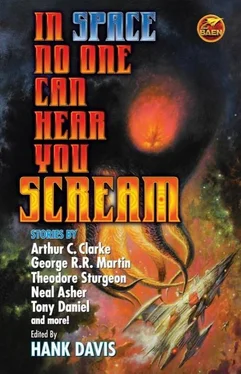Питер Филлипс - In Space No One Can Hear You Scream
Здесь есть возможность читать онлайн «Питер Филлипс - In Space No One Can Hear You Scream» весь текст электронной книги совершенно бесплатно (целиком полную версию без сокращений). В некоторых случаях можно слушать аудио, скачать через торрент в формате fb2 и присутствует краткое содержание. Город: Riverdale, NY, Год выпуска: 2013, ISBN: 2013, Издательство: Baen Books, Жанр: Фантастика и фэнтези, на английском языке. Описание произведения, (предисловие) а так же отзывы посетителей доступны на портале библиотеки ЛибКат.
- Название:In Space No One Can Hear You Scream
- Автор:
- Издательство:Baen Books
- Жанр:
- Год:2013
- Город:Riverdale, NY
- ISBN:978-1-4516-3941-4
- Рейтинг книги:4 / 5. Голосов: 1
-
Избранное:Добавить в избранное
- Отзывы:
-
Ваша оценка:
- 80
- 1
- 2
- 3
- 4
- 5
In Space No One Can Hear You Scream: краткое содержание, описание и аннотация
Предлагаем к чтению аннотацию, описание, краткое содержание или предисловие (зависит от того, что написал сам автор книги «In Space No One Can Hear You Scream»). Если вы не нашли необходимую информацию о книге — напишите в комментариях, мы постараемся отыскать её.
In Space No One Can Hear You Scream — читать онлайн бесплатно полную книгу (весь текст) целиком
Ниже представлен текст книги, разбитый по страницам. Система сохранения места последней прочитанной страницы, позволяет с удобством читать онлайн бесплатно книгу «In Space No One Can Hear You Scream», без необходимости каждый раз заново искать на чём Вы остановились. Поставьте закладку, и сможете в любой момент перейти на страницу, на которой закончили чтение.
Интервал:
Закладка:
“Do you have a fix on the system we recently visited, ship? The one with the crèche trap in orbit around the planet called Earth?”
“Yes, captain.”
“If we turned around and started immediately, do we have enough fuel and supplies to make it back there?”
“Yes, captain.”
Was this really what I wanted? I was more than half a Meeb, or the ship wouldn’t have recognized me as captain. I was afraid to have the ship make a mirror. I was afraid to look myself in the face. My skin was gray and glinted a little from the mech. What would the rest of me look like?
But I was still me. Still Megan. I was just— different , now.
And I had to make sure that the next time a Meeb scout showed up to steal a human child, she got met by some very angry very dangerous moms and dads.
I wiped my tears. Oh, whatever. I was gray. Okay, maybe I was half-human, half-Meeb. This was the way things were. I had to deal with it. I wasn’t a kid anymore. I was eleven. Practically a teenager.
“Take us to Earth, ship.”
Take me home.
Peter Phillips
Say you’re an intrepid space explorer and your ship happens to crash on an uncharted planet—but then you receive radio transmissions from someone outside who’s actually speaking your language. Your obvious reaction would be to take heart and await help. And the ones sending those transmissions are very eager to help, but unfortunately both you and they have not understood the grim realities of the situation . . .
Peter Phillips (1920-2012) was born in London, England. He made a big splash with his story, “Dreams are Sacred” in the September 1948 issue of Astounding Science-Fiction . The story, in which the narrator’s psyche is sent into the mind of a patient who has withdrawn from reality, is now recognized as a classic, and was soon followed by another remarkable story, Manna , in the February 1949 issue of the same magazine. The two stories were noted for striking originality of concept and cheerfulness of outlook. The first quality is certainly true of the story which follows, but “Lost Memory” has an outlook which is anything but cheerful.
LOST MEMORY
Peter Phillips
I collapsed joints and hung up to talk with Dak-whirr. He blinked his eyes in some discomfort.
“What do you want, Palil?” he asked complainingly.
“As if you didn’t know.”
“I can’t give you permission to examine it. The thing is being saved for inspection by the board. What guarantee do I have that you won’t spoil it for them?”
I thrust confidentially at one of his body-plates. “You owe me a favor,” I said. “Remember?”
“That was a long time in the past.”
“Only two thousand revolutions and a reassembly ago. If it wasn’t for me, you’d be eroding in a pit. All I want is a quick look at its thinking part. I’ll vrull the consciousness without laying a single pair of pliers on it.”
He went into a feedback twitch, an indication of the conðflict between his debt to me and his self-conceived duty.
Finally he said, “Very well, but keep tuned to me. If I warn that a board member is coming, remove yourself quickly. Anyway how do you know it has consciousness? It may be mere primal metal.”
“In that form? Don’t be foolish. It’s obviously a manufacture. And I’m not conceited enough to believe that we are the only form of intelligent manufacture in the Universe.”
“Tautologous phrasing, Palil,” Dak-whirr said pedanticðally. “There could not conceivably be ‘unintelligent manufacture.’ There can be no consciousness without manufacture, and no manufacture without intelligence. Therefore there can be no consciousness without intelligence. Now if you should wish to dispute—”
I tuned off his frequency abruptly and hurried away. Dak-whirr is a fool and a bore. Everyone knows there’s a fault in his logic circuit, but he refuses to have it traced down and repaired. Very unintelligent of him.
The thing had been taken into one of the museum sheds by the carriers. I gazed at it in admiration for some moments. It was beautiful, having suffered only slight exterior damage, and was obviously no mere conglomeration of sky metal.
In fact, I immediately thought of it as “he” and endowed it with the attributes of self-knowing, although, of course, his consciousness could not be functioning or he would have attempted communication with us.
I fervently hoped that the board, after his careful disðassembly and study, could restore his awareness so that he could tell us himself which solar system he came from.
Imagine it! He had achieved our dream of many thousands of revolutions—space flight—only to be fused, or worse, in his moment of triumph.
I felt a surge of sympathy for the lonely traveller as he lay there, still, silent, non-emitting. Anyway, I mused, even if we couldn’t restore him to self-knowing, an analysis of his construction might give us the secret of the power he had used to achieve the velocity to escape his planet’s gravity.
In shape and size he was not unlike Swen—or Swen Two, as he called himself after his conversion—who failed so disastrously to reach our satellite, using chemical fuels. But where Swen Two had placed his tubes, the stranger had a curious helical construction studded at irregular intervals with small crystals.
He was thirty-five feet tall, a gracefully tapering cylinder. Standing at his head, I could find no sign of exterior vision cells, so I assumed he had some kind of vrulling sense. There seemed to be no exterior markings at all, except the long, shallow grooves dented in his skin by scraping to a stop along the hard surface of our planet.
I am a reporter with warm current in my wires, not a cold-thinking scientist, so I hesitated before using my own vrulling sense. Even though the stranger was non-aware—perhaps permanently—I felt it would be a presumption, an invasion of privacy. There was nothing else I could do, though, of course.
I started to vrull, gently at first, then harder, until I was positively glowing with effort. It was incredible; his skin seemed absolutely impermeable.
The sudden realisation that metal could be so alien nearly fused something inside me. I found myself backing away in horror, my self-preservation relay working overtime.
Imagine watching one of the beautiful cone-rod-and-cylinder assemblies performing the Dance of the Seven Spanners, as he’s conditioned to do, and then suddenly refusing to do anything except stump around unattractively, or even becoming obstinately motionless, unresponsive. That might give you an idea of how I felt in that dreadful moment.
Then I remembered Dak-whirr’s words—there could be no such thing as an “unintelligent manufacture.” And a product so beautiful could surely not be evil. I overcame my repugðnance and approached again.
I halted as an open transmission came from someone near at hand.
“Who gave that squeaking reporter permission to snoop around here?”
I had forgotten the museum board. Five of them were standing in the doorway of the shed, radiating anger. I recognised Chirik, the chairman, and addressed myself to him. I explained that I’d interfered with nothing and pleaded for permission on behalf of my subscribers to watch their investigation of the stranger. After some argument, they allowed me to stay.
I watched in silence and amusement as one by one they tried to vrull the silent being from space. Each showed the same reaction as myself when they failed to penetrate the skin.
Chirik, who is wheeled—and inordinately vain about his suspension system—flung himself back on his supports and pretended to be thinking.
Читать дальшеИнтервал:
Закладка:
Похожие книги на «In Space No One Can Hear You Scream»
Представляем Вашему вниманию похожие книги на «In Space No One Can Hear You Scream» списком для выбора. Мы отобрали схожую по названию и смыслу литературу в надежде предоставить читателям больше вариантов отыскать новые, интересные, ещё непрочитанные произведения.
Обсуждение, отзывы о книге «In Space No One Can Hear You Scream» и просто собственные мнения читателей. Оставьте ваши комментарии, напишите, что Вы думаете о произведении, его смысле или главных героях. Укажите что конкретно понравилось, а что нет, и почему Вы так считаете.









